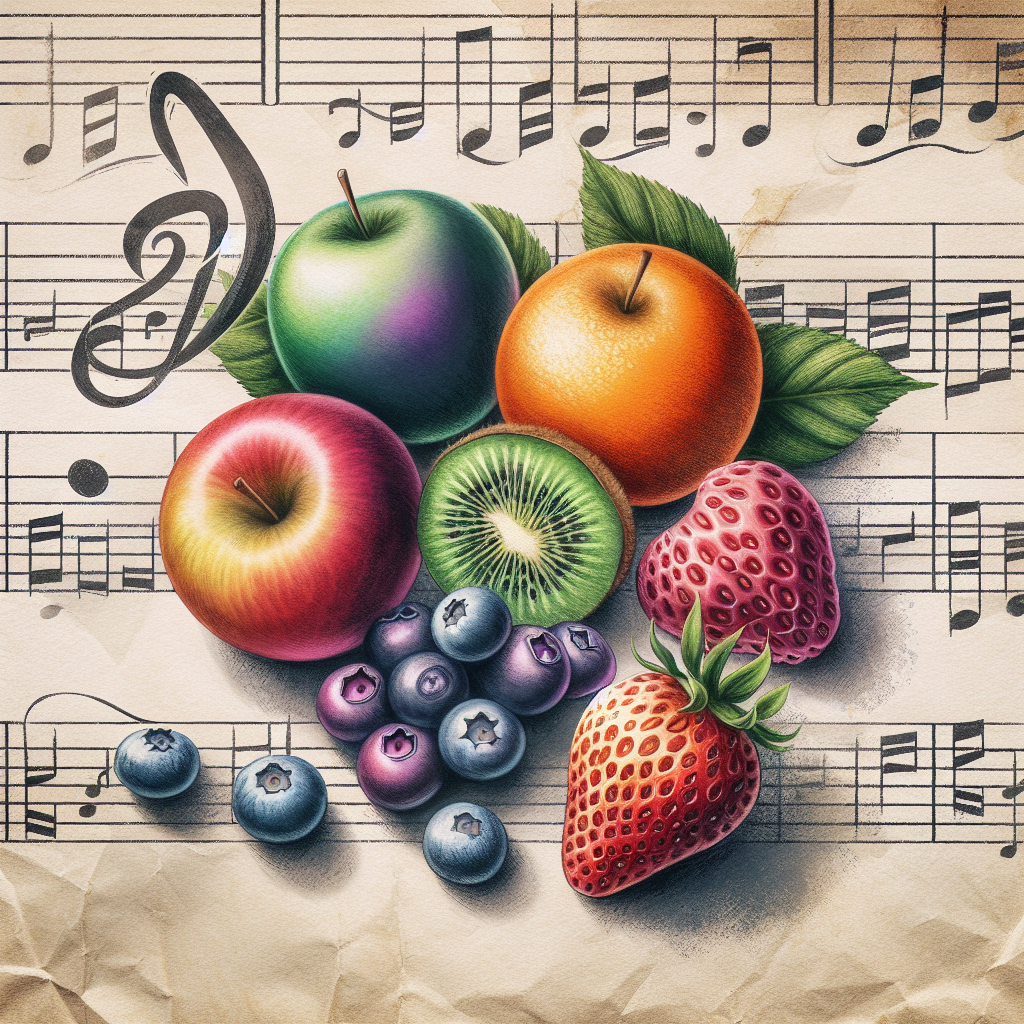The Connection Between Music and Vitamin Intake

Discover the fascinating connection between music and vitamin intake! Uncover how these two seemingly unrelated elements can impact your health and well-being. Learn more and enhance your vitality today. Click here to explore.
Exploring the Link Between Music Therapy and Vitamin Absorption
Music has long been recognized for its therapeutic benefits, offering a soothing balm for the mind and soul. However, recent studies suggest that the healing power of music may extend beyond the psychological realm, potentially influencing physical health by enhancing vitamin absorption. This intriguing connection between music and vitamin intake is a burgeoning field of research that warrants further exploration.
Music therapy, a clinical and evidence-based use of music interventions, has been shown to improve mental health, reduce stress, and even alleviate physical pain. It is a powerful tool that can stimulate various parts of the brain, triggering emotional responses and releasing endorphins, the body’s natural painkillers. But the effects of music therapy may not stop at the brain. Some researchers believe that the physiological changes induced by music could also impact the body’s ability to absorb and utilize vitamins.
Vitamins are essential nutrients that our bodies need in small amounts to function properly. They play crucial roles in various bodily functions, from bone health to immune function, and are typically obtained from the food we eat. However, the body’s ability to absorb these vitamins can be influenced by a variety of factors, including stress levels, gut health, and potentially, music.
The theory behind the connection between music and vitamin absorption is rooted in the idea that music can influence our physiological state. When we listen to music, our heart rate, blood pressure, and stress hormone levels can all be affected. These physiological changes can, in turn, impact the functioning of our digestive system, where most vitamin absorption occurs. For instance, stress has been shown to negatively impact gut health and hinder nutrient absorption. Therefore, if music can reduce stress, it could potentially enhance vitamin absorption by promoting a healthier gut environment.
Moreover, music’s potential impact on vitamin absorption could also be linked to its effect on our eating habits. Research has shown that listening to soothing music during meals can slow down eating pace, which can improve digestion and nutrient absorption. This is because slower eating allows more time for the digestive enzymes in our stomach to break down food, increasing the chances of vitamins being absorbed.
While the connection between music and vitamin intake is still a relatively new area of research, preliminary studies suggest that there may indeed be a link. For instance, a study published in the Journal of Advanced Nursing found that patients who listened to music during meal times experienced improved nutritional intake. Although the study did not specifically measure vitamin absorption, the results suggest that music could potentially enhance the body’s ability to utilize nutrients.
However, it’s important to note that more research is needed to fully understand the relationship between music and vitamin absorption. While the initial findings are promising, they are far from conclusive. Future studies should aim to explore this connection in more depth, examining the specific physiological mechanisms involved and determining the types of music that may be most beneficial.
In conclusion, the connection between music and vitamin intake is a fascinating area of research that could potentially revolutionize our understanding of music therapy’s benefits. While we await further scientific evidence, it certainly wouldn’t hurt to enjoy some soothing tunes during your next meal. After all, music not only feeds the soul but may also nourish the body.
The Impact of Music on Vitamin Intake and Overall Health

Music has long been recognized for its profound impact on human emotions and cognitive processes. However, recent studies suggest that the influence of music extends beyond the realm of the mind, potentially affecting physical health, including vitamin intake. This intriguing connection between music and vitamin intake may seem far-fetched at first glance, but a closer look reveals a fascinating interplay of psychological and physiological factors.
The relationship between music and vitamin intake is primarily mediated through the impact of music on mood and stress levels. Music, with its rhythmic patterns and melodic structures, has a profound effect on our emotional state. It can uplift our spirits, soothe our nerves, and even help us focus. This emotional modulation can significantly influence our dietary choices, including the consumption of vitamin-rich foods.
When we are stressed or in a negative mood, we tend to gravitate towards comfort foods, which are often high in sugar and fat but low in essential nutrients. On the other hand, when we are in a positive mood, we are more likely to make healthier food choices, including fruits, vegetables, and other foods rich in essential vitamins and minerals. By improving our mood, music can indirectly encourage us to consume more vitamin-rich foods, thereby enhancing our vitamin intake.
Moreover, music can also directly influence our physiological responses to food. Research has shown that listening to calming music during meals can slow down our eating pace, leading to smaller portion sizes and increased satiety. This mindful eating can help us better appreciate the taste and texture of vitamin-rich foods, making us more likely to incorporate them into our diet.
In addition to influencing vitamin intake, music can also enhance the absorption of these essential nutrients. Stress has been found to inhibit the absorption of various nutrients, including vitamins. By reducing stress levels, music can potentially improve our body’s ability to absorb and utilize these vitamins, thereby contributing to our overall health.
The impact of music on vitamin intake and overall health is not just theoretical but has been supported by empirical evidence. For instance, a study published in the Journal of Behavioral Medicine found that participants who listened to music while eating consumed significantly fewer calories and reported greater enjoyment of their food compared to those who ate in silence. This suggests that music can enhance the enjoyment of eating, potentially encouraging the consumption of healthier, vitamin-rich foods.
In conclusion, the connection between music and vitamin intake is a fascinating area of research that offers promising implications for health and wellness. By leveraging the power of music, we can potentially improve our dietary habits, enhance our vitamin intake, and boost our overall health. However, it’s important to note that while music can be a powerful tool for promoting healthier eating habits, it should not replace a balanced diet and regular exercise. As always, it’s essential to consult with a healthcare professional before making any significant changes to your diet or lifestyle.
Harmonizing Health: The Surprising Connection Between Music and Vitamin Intake
Harmonizing Health: The Surprising Connection Between Music and Vitamin Intake
Music, a universal language that transcends cultural and linguistic barriers, has been a part of human life for centuries. It has the power to evoke emotions, inspire creativity, and even influence our health. On the other hand, vitamins, essential nutrients that our bodies need to function properly, play a crucial role in maintaining our overall health. At first glance, music and vitamins may seem like two unrelated aspects of our lives. However, recent studies have revealed a fascinating connection between these two seemingly disparate elements: music and vitamin intake.
The relationship between music and health is not a new concept. Music therapy, for instance, has been used as a complementary treatment for various health conditions, including mental health disorders, neurological disorders, and chronic pain. It has been found to reduce stress, improve mood, and even boost the immune system. But how does this relate to vitamin intake?
The answer lies in the physiological responses that music can induce. When we listen to music we enjoy, our brain releases dopamine, a neurotransmitter associated with feelings of pleasure and reward. This release of dopamine can stimulate the digestive system, improving our body’s ability to absorb nutrients from the food we eat. This means that listening to music during meals can potentially enhance our vitamin intake, contributing to better health.
Moreover, certain types of music can influence our eating habits. Fast-paced music, for example, can make us eat faster and consume more food, while slow-paced music can make us eat slower and consume less. This can have a significant impact on our vitamin intake. If we eat too quickly, our body may not have enough time to absorb all the vitamins from the food. Conversely, if we eat too slowly, we may not consume enough food to meet our vitamin needs.
In addition to influencing our eating habits, music can also affect our food choices. Research has shown that listening to different types of music can make certain foods seem more appealing. For instance, classical music has been found to make people perceive food as more flavorful, which can encourage them to eat more nutrient-rich foods. This can lead to an increased intake of vitamins, further highlighting the connection between music and vitamin intake.
However, it’s important to note that while music can enhance vitamin intake, it’s not a substitute for a balanced diet. To ensure we get all the necessary vitamins, we need to consume a variety of foods, including fruits, vegetables, whole grains, lean proteins, and healthy fats. Listening to music can complement these dietary habits, but it shouldn’t replace them.
In conclusion, the connection between music and vitamin intake is a testament to the profound impact that music can have on our lives. It’s not just a source of entertainment or a form of artistic expression; it’s also a tool that can help us improve our health. So the next time you sit down for a meal, consider putting on some of your favorite tunes. Not only will you enjoy your food more, but you might also boost your vitamin intake in the process.